At CGArtefacts we belive in personal growth and continuous education. This is a list of books we recommend reading with brief reviews by George Cretu
Currently reading:
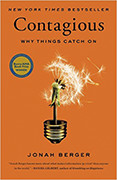
Contagious: Why Things Catch On, by Jonah Berger
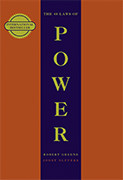
The 48 Laws of Power, by Robert Greene
Recent reads:
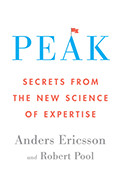
Peak: Secrets from the New Science of Expertise, by K. Anders Ericsson, Robert Pool
Definitely one of my favourite books of the year. Somehow a harder read than I think it would be but it's in no way repetitive, it's just persistent in pointing out that --spoiler allert-- genetics and timing play a significantly smaller role in the skills and success anyone can aquire in any field than contemporary general belief takes. The key, the authors point out, is that it's not just about throughing in thousands of hours of practice, but rather that plus practicing in a manner which is in depth described in the book as deliberate practice.
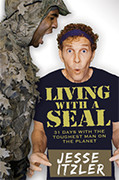
Living with a SEAL: 31 Days Training with the Toughest Man on the Planet, by Jesse Itzler
Toughest man on the planet seems like a tall order to live up to but SEAL, as Jessie's "trainer" is named throughout the book, is up and above that. The book is fundamentally about what I believe to be the key to living a successful life, Grit. Also referred to as mental toughness, more and more recent cognitive research suggests that it is directly linked to achieving expert performance in any field. There's a lot of physical and mental pressure throughout the book and it's presented in a very raw style and that conveys the message so much better. Finally it's not a feel good book, that you read and then go for a burrito, it's the kind that gets you up and working out the next day before the sun is up.
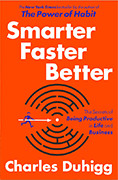
Smarter Faster Better: The Secrets of Being Productive in Life and Business, by Charles Duhigg
Charles Duhigg is one of my favorite authors and this book is one of the reasons why. I've read perhaps a hundred articles on productivity and this book renders them obsolete. Written in a narrative style with many interesting stories that plot the significance of the factors that Duhigg considers significant, the book is a very easy read. The stories are there just to make things more interesting and memorable but behind them lie literally hundreds of interviews and research papers that the author processed to distill the few actionable components that influence productivity most.
Core books:

The Selfish Gene, by Richard Dawkins
First book on my list for its foundational character, and for the respect I have towards Dawkins as one of those writers capable of explaining a complex concept with clarity. The 30th Anniversary Edition includes two new chapters, covering, among other things the topic of memes a term coined by the author from the main topic of this book: genes.

How the Mind Works, by Steven Pinker
Another foundational book, originally published in 1997 is now necessarily outdated. However, it’s very interesting how many of the concepts presented by the author as yet to be validated turned out to be true after many years of research. More importantly, the conclusion the author draws becomes the thesis of many of the books below. Pinker’s take on many of the subjects is light hearted and the reading is kept fluid by extensive use of references that support his views.

Intuition Pumps And Other Tools for Thinking, by Daniel C. Dennett
This one is historical not in the sense that it's old, like the previous two, but in the sense that it draws it's substance from past work by the author, a best off in a way. Dennett, like the previous two authors, is very much interested in reaching a wider audience so he's shaped the book in a way that would make his concepts as memorable as possible, hence the title. Dennett is also one of those contemporary philosophers that aims to match his understanding of IT and neurology with at least that of an undergrad in the field and then outmatch a PHD in explaining what he knows.

Misbehaving: The Making of Behavioral Economics, by Richard H. Thaler
Shifting gears, this is an economics book at its core, historical in the sense that it covers the birth of a new type of economics but fundamentally is, like all other books in this list, about the behaviour of people. The book is written after Nudge(2008), a global bestseller and picks up many of the concepts from that. They are presented though in the logic of how the world of economy confronted a behavioral approach which currently dominates the theoretical discourse and, in some lucky cases like the UK, political actions.

Moral Tribes: Emotion, Reason, and the Gap Between Us and Them, by Joshua Greene
Back to philosophy. This is the book to read before commenting on the immigration issues so prevalent in the media nowadays. It's interesting how a philosopher, interested in his teens by the process of argumentation, ends up writing a book that's fundamentally about how bad we're equipped, biologically, to handle a [logical] argument. Greene touches the famed trolley problem and uses it to kickstart his theory. The book is made a very easy read by the author who emphasises its structure and makes use of clever analogies.

Creativity: Flow and the Psychology of Discovery and Invention, by Mihaly Csikszentmihalyi
Another book that brings back concepts from previous works, in this case almost inevitable as Csikszentmihalyi was one of the first to study creativity scientifically. The concept of flow is fundamental to anything you might read on productivity so this book is foundational in this regard. It's also a great achievement that the theories presented are drawn upon 100 interviews with exceptionally creative people, from a vast array of fields, from artists and poets to physicists and politicians, all of them renowned in their respective fields, many of whom awarded Nobel prizes and/or equivalent distinctions.

Creativity, Inc.: Overcoming the Unseen Forces That Stand in the Way of True Inspiration, by Ed Catmull, Amy Wallace
I may be biased in including this book in the core books category as there is a lot in it that's about the history of Pixar and CG, but I hope you'll be biased too. The book is also about specific approaches used by Ed Catmull as Pixar's director to keep an incredible track record of creative output. Looking at the entertainment business of today, with endless franchises, what Pixar has achieved is outstanding. The books ends with some personal notes on Steve Jobs, probably the best you'll read since it doesn't fall in the false dichotomy of most biographers of placing Jobs at either ends of a spectrum.

The Hard Thing About Hard Things: Building a Business When There Are No Easy Answers, by Ben Horowitz
A business book that focuses on people and company politics from the co-founder of one of the most appreciated VC firms in Silicon Valley. Like many of the above it brings the history of the author's business into focus as means to illustrate the lessons he learnt that led to the $1.6 billion in cash acquisition by HP. While focusing on business when discussing both examples and tactics the core lessons of the book are valid in any field where interaction with peers is important.

Thinking, Fast and Slow, by Daniel Kahneman
This is a book that covers the theories for which Kahneman, a psychologist by formation, was awarded the Nobel prize in economy in 2002 for work that he did alongside the late Amos Tversky and the above mentioned Richard Thaller. In fact, Thaler's book and this one basically share a chapter, obviously presented in a different light by each author. The core premise of the book is also the premise onto which Joshua Greene lays his reasoning, though here the premise is taken to three different implications than the ethics that are sought in Moral Tribes. The author is exceptionally good at creating valid experiments to test a premise or another and extends those problem framing skills to his writing style.

The Power of Habit: Why We Do What We Do in Life and Business, by Charles Duhigg
After the premise set by all the previous books, with no exception, which is that we're in no way intrinsically equipped to make rational judgement calls in many scenarios of our daily lives, this book proposes a solution: habits. A habit is something you do without thinking, which works great when you're not prone to think straight. The challenge becomes to identify and change your bad habits and cultivate good ones. As a rather recent book, it draws a lot from new discoveries in neurosciences and in many studies that focus on business and productivity.

The Ego Tunnel: The Science of the Mind and the Myth of the Self, by Thomas Metzinger
The last book in the set, and for good reason, this is a harder read and will take some background information to make it a fluent lecture. Interestingly enough, this close to 300 pages read is the easy version of his previous 700 page Being No One: The Self-Model Theory of Subjectivity in a gesture to target a wider audience. In essence, this is the How the Mind Works version of a German philosopher, written after many technological and theoretical advances were made since Pinker published his work. Also noteworthy is how the book isn't a philosophical discourse in almost any way, up until the last chapter, which is practically the only time the voice of the author is heard. Up to that point Metzinger weaves together a fundamentally scientific argument to support his theory.
Business reads and others:
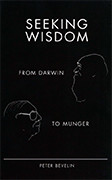
Seeking Wisdom: From Darwin To Munger, by Peter Bevelin
This one focuses on learning and learning from mistakes. There is a heavy business and economics focus in it and it's also based quite a bit on the lives and works of Charles Munger and Warren E. Buffett, partners at Berkshire Hathaway one of the largest public companies in the world. The book is multidisciplinary in its approach and it covers many of the biases discussed in the above reads.
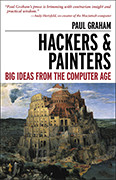
Hackers & Painters: Big Ideas from the Computer Age, by Paul Graham
A book programmers should enjoy though, except his programming references and a chapter dedicated to which language is the best, it covers a lot of great lessons in building a startup, leadership and generally expresses the views of the author on several daily life topics. Graham is the founder of Y Combinator on the first and currently one of the most sought after seed capital firms in the world.
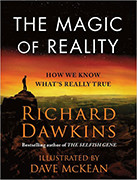
The Magic of Reality: How We Know What's Really True, by Richard Dawkins
This one was probably written for teenagers as it's a light read with some chapters focused on a set of natural phenomena, many of which are fundamental. I've included it because, given all that, it's very likely that you'll learn some new facts and the way he uncovers how people used to think about the topics presented is most revealing.
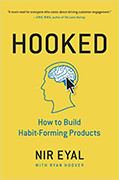
Hooked: How to Build Habit-Forming Products, by Nir Eyal
Another book on habits, not included in the core list because this one is laser targeted on business and products. The author also breaks down many popular, contemporary products from the iPhone to Pinterest and tries to explain how products influence our behaviour.
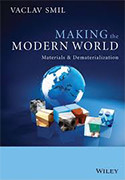
Making the Modern World: Materials and Dematerialization, by Vaclav Smil
Smil is one of Bill Gates favourite authors and the billionaire philanthropist recently endorsed this particular book. The methodology behind each research is described in detail and the premise of the book is a bit unnerving. At some point the books becomes a lot about China, for no other reason other than the fact that it's the country with the most output, of just just about everything.

Zero to One: Notes on Startups, or How to Build the Future, by Peter Thiel
I debated quite a bit if I should include this in the Core Books section because there seemed to be a lot of advice and opinions about how the world works and then it hit me. The author talkes some incredibly complex topics but essentially expresses his opinions on the matter with only his [vast] experience on the subject to back up his hypothesis. This is essentialy a books about sales, the author sells his views as well as solid business advice.